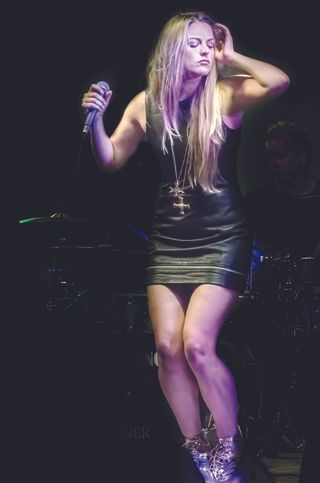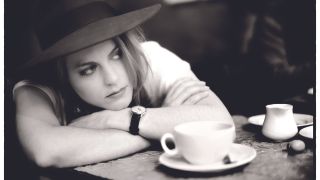“I’m incredibly grateful to the blues community and always will be,” says Jo Harman. “They’ve been really supportive and really got behind me, but…” she pauses, takes a deep breath, “and this is me being totally honest with you, the blues community really needs to self regulate, it needs to get a lot more fussy. And by that I mean everyone involved in it, from what the fans choose to buy, to who the promoters book, to who the festivals put on, we need some real quality control here. Because at the moment it seems there are a lot of old white men with long hair playing three chords in their local pub, doing covers of old blues songs that have no relation to their lives, singing about railway tracks and the cotton fields. I tell my own story.”
The gloves are off. The 31-year-old singer, born in London, raised in Devon, now back in London, isn’t afraid to voice what a lot of shy blues fans, not to mention many artists themselves, are actually thinking.
“Most serious musicians, they want to disassociate with the blues community, it’s not seen as cool. It should be, but it really isn’t. I’ve been lucky, I’ve met genuine music fans through it, but there is a real down side. It can be very limiting, very prescriptive and when I get a comment on Facebook saying how ‘Jo Harman isn’t blues’, I want to say: ‘Well, tell me exactly what your definition of the blues is, because old white men playing covers, that’s just pub rock, not the blues.’ I’ve made the decision not to follow what everyone else is doing. Good luck to them, I’ve got nothing against them doing their thing, but it’s just not for me. I’ve got big aspirations, big ambitions, I’m doing something different and always will be.”
Jo Harman doesn’t like “restricting” labels, and she doesn’t call herself a blues singer, although she says her place in the blues community isn’t up for debate, “because my music is always rooted in the blues, always has been, always will be. But I do a bit of gospel, a bit of soul, a bit of rock, a bit of country. I do intimate singer-songwriter stuff, with just a piano and vocal, and on my last EP [this year’s Found A Place], there are some really weird, fucked-up sounds on that. And my fans are following me. I’m taking them along with me on my artistic journey and I genuinely believe that whatever I do next, these fans will stay with me. Okay, rant over now, let’s get on with the interview.”
Harman’s journey began with Aretha Franklin when she was just 14 years of age. “It really did change my life hearing I Never Loved A Man The Way I Love You,” she says. She started out playing classical music on the bassoon, achieving grade eight – the highest grade – and performing in youth orchestras before receiving a degree in performing arts and graduating from the Brighton Institute Of Modern Music. It was her voice, though, likened to Aretha, that got her noticed. She was central to Brighton’s Soul Reality Collective, then as the Jo Harman Project she worked with the Grammy award-winning producer and engineer Pete Smith (Stevie Wonder, Van Morrison, Sting) and Boe Larsen of Denmark’s MillFactory. Her expressive voice also got her support gigs with soul and jazz legends Candi Staton and Marlena Shaw, then a tour with the Average White Band.
She issued her debut album, Dirt On My Tongue, in 2013. Franklin, Staton and Shaw’s influence can be heard in the record’s timeless songcraft, in its soulful delivery, its intimacy, honesty and execution, but Harman is her own woman. “It’s always been important to do things my own way,” she says. “Yes, I want to sell a million records, but I don’t want to have to compromise to do it.” That first record proved she could stay true to her creative principles, but have commercial clout too. A combination of word of mouth and rave reviews catapulted her into the spotlight and in three years she went from bright young thing to blues ambassador both at home and on the international stage. In 2014 she was voted best female vocalist and was a songwriter of the year runner-up at the British Blues Awards.
This year will see her perform at BluesFest, the annual London festival, for the third consecutive year. “It’s a real privilege to be asked back and I’m really excited as Tedeschi Trucks Band, one of my favourite bands, are playing just before me, so I’ll definitely watch them,” she says. “The prestige of BluesFest is second to none, it’s really important to have high-end events for the blues as they bring the music to a new audience. They’ve got wider appeal and we need to reach as many people as possible.”

Harman’s appeal has stretched throughout Europe. In 2013, she was one of 12 artists invited to perform at Parkpop, Europe’s biggest free festival, which is held annually at The Hague, Netherlands. “That was a real highlight for me. The festival gets 300,000 people passing through it in one day. It was really special. We hadn’t released the album in Europe then, just had a low-key release in the UK, so to be playing on a bill where everyone else was a household name – Bob Geldof was doing it, Sinead O’Connor was doing it too – that was cool and we hung out back at the hotel after.”
She also performed for folk singer Joan Baez at the prestigious Ambassador Of Conscience Awards for Amnesty International in Berlin in May of this year – Baez was being awarded along with artist Ai Weiwei. Amnesty International is very close to Harman’s heart; at a show a few years back she was approached by one of the organisation’s directors, and jumped at the chance to help in any way she could.
“Being involved has been another real stand-out for me,” she says. “The awards was an amazing day, really incredible. I was bowled over by the people who were there, their commitment to the cause, the experiences they’d had. It was a very powerful environment to be in, with people I have the utmost respect for. Joan’s dedicated her whole life to fighting for human rights. I was sat next to Wu’er Kaixi, he was one of the leaders of the protest in Tiananmen Square in 1989. Many of his friends and colleagues were massacred, he fled and he’s one of China’s most wanted. What he must have seen is just out of my realm of imagining, and he was so warm in spirit and generous and open. I was really struck with him.”
Patti Smith presented Baez with her award, while the performers paying homage included German songwriter Clueso, Venezuelan pianist Gabriela Montero, Irish songwriter Glen Hansard, American jazz guitarist Kurt Rosenwinkel, Irish actress Lisa Dwan and Harman. “I was really nervous,” she admits. “I hadn’t felt nervous like that in a really long time, but it was good, it brings you back into the moment, reminds you why you are doing this.”
She performed three songs with her friend Carl Hudson on cello – her own I Shall Not Be Moved, which opens Dirt On My Tongue, Oh, Freedom which is a traditional spiritual synonymous with Joan Baez and the American 60s civil rights movement – Baez sang it on the 1963 March On Washington – and a cover of Bob Dylan’s Forever Young, which Baez has covered live. “And it turned out alright,” she says.
Next month she sets her sights on the States, as she will visit the country for the first time when she flies to Nashville to record her second album.
It wasn’t an off-the-cuff decision to record there, but it wasn’t planned either. “I’ve always had dreams of recording in the US, I want to go to a church in the deep south and experience gospel music there,” she says. “I want to go to New York and surround myself with some amazing musicians in a studio there, and I knew one day I’d record in America but I didn’t think it would be with my second album.”
It makes perfect sense, as Sands Foley, a cool boutique label with its finger on the pulse who are also responsible for Harman’s US management, relocated from NYC to Nashville a few months ago.
“We flew over for six days, we had lots of meetings with different people, met everyone involved with the label, met different writers and musicians and it just felt right to do it there,” she says.
It helped that opposite the hotel gym was the Johnny Cash museum, and also that she got to go backstage at the Grand Ole Opry and sit on the stage while Clare Bowen, who plays Scarlett O’Connor in Nashville, the TV drama about the country music industry, performed to a sold-out crowd.
“I can’t wait to go back,” Harman enthuses, “I want to do all the music sights, I really want to go to the Country Music Hall Of Fame.”
She hopes to have written the album by the time she arrives in Nashville. “There’s still a lot of work to do but I have done a decent chunk of it. I tend to write at home, at night, in the quiet, on my own so I can get into my own head. I’m not good at going out and writing in a café, there are too many distractions. I’ll sit at the piano or with my guitar and a melody will suddenly come and I’ve got a notebook, I jot down anything that inspires me in it, something someone has said, something I’ve seen, something that just comes into my head. I’ve also been working with Mike Davis who produced the first album, we’ve been writing in his studio.”

With a working title, The Reformation, it’s scheduled for release in early 2016, but Jo is saying little else.
“I can’t comment on which studio we will be working in or who will be producing it,” she says. “We are still in the planning stage but there are plenty of avenues we are looking into. No major decisions have been made yet. I’m just really excited to be going to Nashville. But rest assured, the album’s going to be the same old kind of stuff for me, my own insecurities, the ups and downs of life and love… it’s very personal. I’m telling my own story again.”
Jo Harman might not call herself a blues artist, but self expression and autobiography is the very essence of the blues, and she is the real thing.
Dirt On My Tongue is out now via The Big Chill.
Songs From The Soul
The music that changed Jo’s life.
Aretha Franklin
Yield Not To Temptation
JVB/Battle, 1956
When I heard some of her earliest gospel recordings I had more of an understanding of my connection with her. I could almost touch her voice in a way that full production sometimes didn’t allow. She seems naive but knowing here, all at the same time.
Lauryn Hill
The Miseducation Of Lauryn Hill
Ruffhouse, 1998
Such artistry, although the 14-year-old me didn’t think about that. There was such pain in her every word. Only recently did I realise the album was fuelled by her on/off affair with Wyclef Jean. I split up with my first boyfriend to this record, shedding many a tear listening to it. Lauren understood me in a world of confusing teenage-ness.
The Beatles
A Day In The Life
Parlophone, 1967
I loved its playfulness, adored Ringo’s drumming, longed to be in that orchestra. Hearing this helped me understand what it meant to be creative with sound, that there are no rules, or if there are, they are there to be broken.
Stevie Wonder
They Won’t Go When I Go
Tamla, 1974
When I first heard this, it stopped me in my tracks. Simple as. Hauntingly beautiful, an unparalleled vocal, my favourite ever Stevie track.
Foy Vance
Indiscriminate Act Of Kindness
Wurdamouth, 2007
A masterpiece. It epitomises the dichotomies within the craft of songwriting. It is storytelling at its most humanely compelling. When I was a very fledgling singer-songwriter, I opened for Foy in Brighton and his performance changed me forever.
Moody Blues
Nights In White Satin
Deram, 1967
My father’s favourite band. After he died I would take my guitar to his grave and sit and play this to him, imagining that I could hear him singing along. This and Forever Autumn by Justin Hayward remind me of him the most. I miss him terribly.

